What are the Best-Paying Community College Degrees?
In a world where higher education has become synonymous with skyrocketing tuition fees and mounting student loan debt, it’s easy to overlook the untapped potential and transformative opportunities that lie within community colleges. Often overshadowed by their prestigious four-year counterparts, community college degrees have quietly emerged as a beacon of hope for countless individuals seeking affordable and accessible paths to academic and career success.
Gone are the days when community colleges were considered merely stepping stones or second-tier options. Today, they serve as vibrant hubs of learning, innovation, and community engagement. With a diverse range of programs and flexible schedules tailored to the needs of a diverse student population, community colleges have redefined the educational landscape and shattered the barriers that once limited the pursuit of knowledge and personal growth.
In this blog post, we aim to shed light on the immense value and untapped potential of community college degrees. From debunking common misconceptions to exploring the myriad of benefits they offer, we will delve into why these degrees are increasingly becoming the preferred choice for individuals determined to carve out a successful future. Whether you’re a high school graduate contemplating your next steps, a working professional seeking to enhance your skill set, or a career changer in pursuit of a new passion, community colleges hold the keys to unlock your true potential.
What are Community College Degrees?

A community college degree is an academic credential awarded by a community college, which is a type of higher education institution that typically offers two-year or two semesters associate degree programs and vocational or technical training programs. Community colleges are also commonly known as junior colleges, technical colleges, trade schools, and certificate programs, and they often serve as an accessible and affordable option for students pursuing higher education or vocational training. Financial aid is also a viable option for most people that enroll in these types of colleges.
Eligibility requirements for enrolling in a community college degree program may vary depending on the country and the specific institution. In general, individuals who have completed their secondary education or equivalent, such as a high school diploma or its equivalent, may be eligible to enroll in a community college degree program. Some programs may also have additional requirements, such as placement tests or prerequisites, depending on the field of study or program.
Community college degrees are offered by institutions in many countries around the world, including the United States, Canada, Australia, the United Kingdom, and other countries. The types of degrees offered by community colleges may vary depending on the country and the specific institution but typically include associate degrees in fields such as arts, sciences, business, health sciences, applied sciences, and vocational or technical programs.
Community colleges often provide opportunities for students to transfer to four-year colleges or universities to pursue higher-level degrees, or to enter the workforce directly with the skills and training gained from their community college degree program.
If you want to now more about what the other types of degrees and their differences, our article about the types of degrees can be useful.
Advantages of Community College Degrees
- Affordability: Community college degrees are generally more affordable compared to four-year college or university degrees. Tuition and fees at community colleges are often lower, making it a more cost-effective option for students who are looking to pursue higher education without incurring significant debt. As mentioned earlier, financial aid is a viable option for these community colleges.
- Accessibility: Community colleges are often more accessible to a wide range of students, including those who may not meet the eligibility requirements of four-year colleges or universities. Community colleges typically have open enrollment policies, allowing students to enroll in courses and programs without rigorous admission requirements. With the complex global issues specifically on education, these community colleges are definitely a good aid.
- Flexibility: Community colleges often offer flexible scheduling options, including part-time and evening classes, which can be beneficial for students who are working or have other responsibilities. This flexibility allows students to customize their education and balance their studies with their personal or professional commitments. Having one or more degrees is also a feasible plan.
- Vocational and Technical Training: Community colleges often offer vocational and technical training programs that are designed to prepare students with the skills and knowledge needed for specific careers. These programs can lead to high-demand jobs in fields such as healthcare, information technology, manufacturing, and more, making community college degrees a practical choice for career-focused individuals. These are usually done in an on-the-job experience format.
- Transfer Opportunities: Many community colleges have articulation agreements with four-year colleges and universities, allowing students to transfer their credits and continue their education toward a bachelor’s degree. This can be a cost-effective pathway for students who plan to pursue a higher level of education but want to start with a more affordable community college degree.
Overall, community college degrees can offer advantages in terms of affordability, accessibility, flexibility, vocational and technical training, and transfer opportunities, making them a viable option for students seeking higher education or career training.

Disadvantages of Community College Degrees
- Limited Program Offerings:Community colleges may have a more limited range of certificate programs offerings compared to four-year colleges or universities. This could result in fewer options for students who have specific career goals or interests that are not covered by the available programs at community colleges.
- Transfer Challenges: While many community colleges have articulation agreements with four-year institutions, transferring credits and transitioning to a bachelor’s degree program may not always be seamless, especially for some other programs that are highly specific in nature.. Students may face challenges in credit transfer, course equivalencies, or meeting specific admission requirements, which could delay or complicate their educational journey.
- Less Campus Life and Resources: Community colleges often have smaller campuses and fewer resources compared to larger universities. This may result in limited extracurricular activities, sports teams, campus facilities, or student support services, which could impact the overall college experience for some students.
- Perception and Stigma: There may be a perception or stigma associated with attending a community college, with some individuals viewing it as a lesser option compared to traditional four-year colleges or universities. This could potentially impact students’ self-esteem, confidence, or social interactions, and may require them to overcome societal biases or stereotypes.
It’s important to note that these disadvantages may vary depending on the specific community college and the individual circumstances of the student. Community colleges can still provide valuable education and training opportunities for many students to explore, and the disadvantages can often be mitigated with careful planning, proactive engagement, and leveraging available resources.
5 Highest Paying Community College Degrees
Listed below are a few fulfilling career fields that can offer graduates decent pay, and amazing real-world experience in the professional enrichment aspect of their career path.
Radiation Therapy
Radiation therapy is a medical profession that involves the use of high-energy radiation, such as X-rays or gamma rays, to treat cancer and other diseases. Radiation therapists work with oncologists and other healthcare professionals to administer prescribed doses of radiation to patients, follow treatment plans, handle high-tech equipment, and monitor patients’ progress. Students that have a high interest in hands-on work which primarily focuses on creating healthier lives can consider this a good career choice.
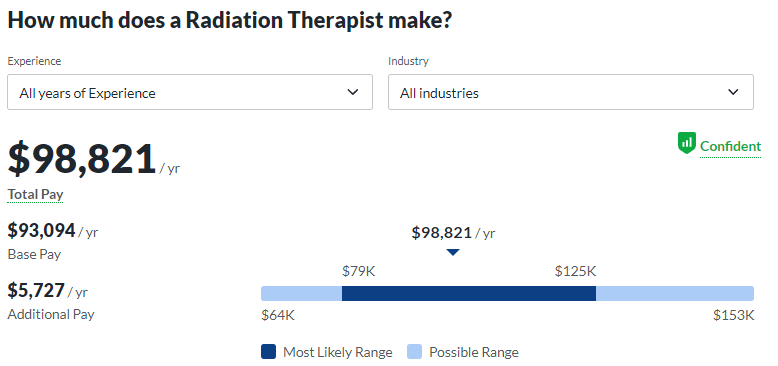
Just 2 thousand dollars are shy of a hundred thousand, Radiation Therapists earn an average of $98,821 per year.
Project Management Pathway
Project management is a professional field that involves planning, organizing, and overseeing projects to achieve specific goals and objectives. Project managers are responsible for leading cross-functional teams, managing budgets, timelines, and resources while they creatively solve problems, and ensuring successful project delivery within scope, time, and budget constraints across various industries of interest such as construction, IT, healthcare, finance, and more.
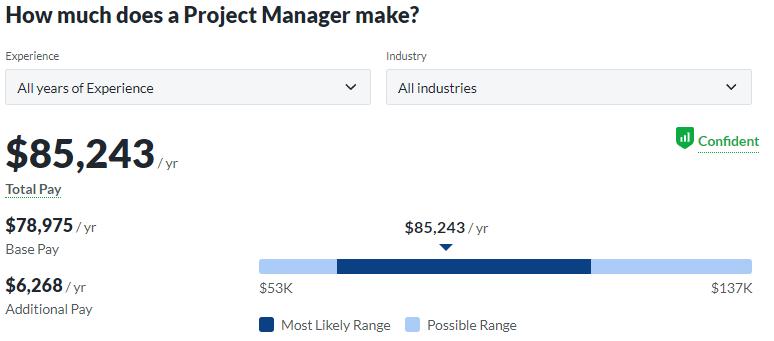
Project Management is a field that may grant someone an opportunity to earn an average of $85,243 annual salary.
Nuclear Medicine
Nuclear medicine is a medical specialty that uses radioactive materials to diagnose and treat diseases. Nuclear medicine technologists prepare and administer radioactive drugs to patients, operate imaging equipment to create images of the distribution of radioactive materials in the body and work closely with physicians to interpret the results and provide patient care.
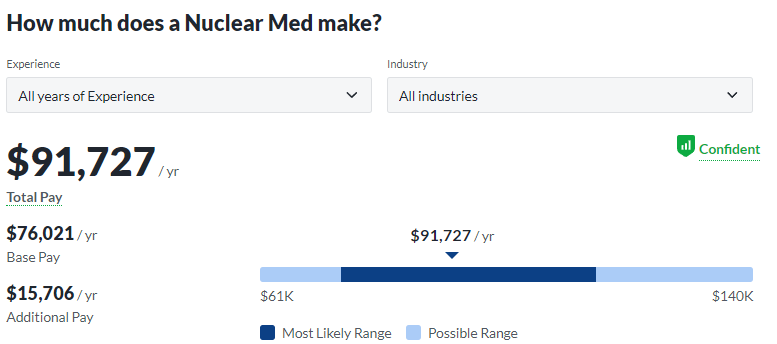
Nuclear Medicine can get someone to earn an average of $91,727 per year.
Software Engineering
Software engineering is a field that involves the design, development, testing, and maintenance of software systems. Software engineers use programming languages, software development and web design methodologies, and tools to create and improve software applications, and systems that meet specific user requirements. They work in various industries, such as technology, finance, healthcare, and more, to develop software solutions for diverse purposes. Students that have a high interest in technology and modern advancements are very welcome to try this career path.
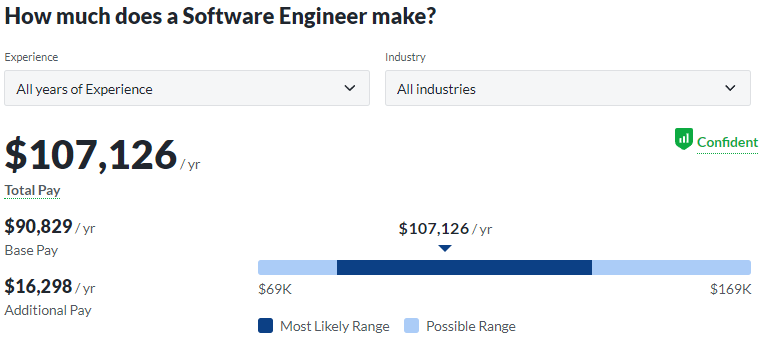
Software Engineers earn an estimated $107,126 per year according to Glassdoor.com
Computer Science and Mathematics
Computer science and mathematics are both academic disciplines that involve the study of theoretical and practical aspects of computing, tech support, programming, and college-level math concepts. Professionals in these fields may work as researchers, educators, or practitioners in areas such as software development, data science, artificial intelligence, cryptography, financial modeling, and more, using their knowledge of computer science and mathematics to solve complex problems and develop innovative solutions. Of course, this career path aligns perfectly with a challenging stem career.
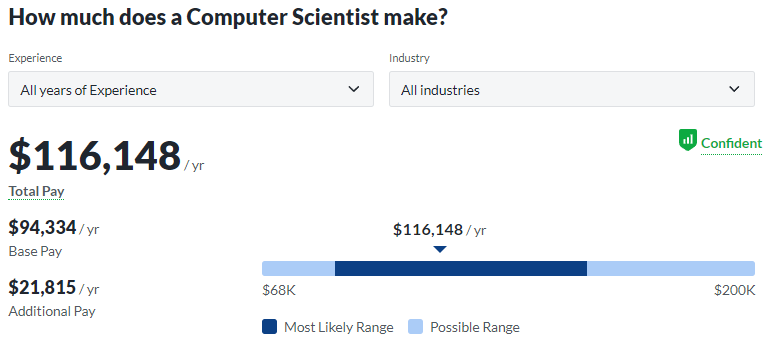
Anything related to computers really has a rewarding career! Computer scientists are said to earn $116,148 on average per year according to Glassdoor.com
Associate Degree for Transfer
An Associate Degree for Transfer (ADT) is a type of degree offered by some community colleges in the United States that are designed to provide a clear pathway for students to transfer to a four-year college or university to complete their bachelor’s degree. ADT programs are typically designed to align with specific majors or fields of study and include a specific set of courses that fulfill lower-division general education and major requirements at both the community college and the four-year institution.
ADT programs are intended to streamline the transfer process and ensure that students who complete the degree will be admitted to a California State University (CSU) or University of California (UC) campus as a junior, with the possibility of earning their bachelor’s degree in two additional years of study. The ADT program is designed to provide students with a more affordable and accessible pathway to earn a bachelor’s degree by completing lower-division coursework at a community college and then transferring to a four-year institution to complete their upper-division coursework.
It’s important to note that ADT programs may have specific requirements, eligibility criteria, and transfer agreements with partnering four-year institutions, so it’s important for students to research and work closely with academic advisors to ensure they meet all the necessary requirements for successful transfer. ADT programs can be a valuable option for students to reach for a more affordable and efficient pathway to earning a bachelor’s degree while attending a community college.
What is a Bachelor’s Degree Program and How Does it Differ From Community College Degrees?
A Bachelor’s Degree Program is an undergraduate program offered by colleges and universities that typically requires four years of full-time study to complete. It is a higher level of education beyond high school and is awarded upon the successful completion of a specified number of credit hours, typically ranging from 120 to 140 credits, depending on the program and institution. Bachelor’s degrees are typically designed to prepare students with a comprehensive education in a specific field of study, such as engineering, business, nursing, or liberal arts, and may include general education requirements, major-specific coursework, and electives.
On the other hand, Community College Degrees, also known as Associate’s Degrees, are typically two-year programs offered by community colleges that provide students with foundational knowledge and skills in various fields. Community college degrees may be awarded in different forms, such as Associate of Arts (AA), Associate of Science (AS), or Associate of Applied Science (AAS), depending on the program and institution. Community college degrees generally include general education requirements, as well as some major-specific coursework, but are typically more focused and career-oriented than bachelor’s degrees.
There are several key differences between Bachelor’s Degree Programs and Community College Degrees:
- Duration: Bachelor’s Degree Programs typically require four years of full-time study, while Community College Degrees typically require two years of full-time study.
- Credit Hours: Bachelor’s Degree Programs generally require a higher number of credit hours, typically ranging from 120 to 140 credits, compared to Community College Degrees, which typically require around 60 to 90 credits.
- Depth of Study: Bachelor’s Degree Programs typically provide a more comprehensive and in-depth education in a specific field of study, while Community College Degrees are generally more focused and career-oriented.
- Transferability: Bachelor’s degrees are typically more transferable to other institutions, both domestically and internationally, while Community College Degrees are typically more geared towards immediate employment or transfer to a four-year institution.
- Cost: Community College Degrees are generally more affordable than Bachelor’s Degree Programs, making them a popular option for students who plan to explore a more cost-effective pathway to higher education.
It’s important to note that both Bachelor’s Degree Programs and Community College Degrees can be valuable options for students, depending on their individual goals, interests, and circumstances. Bachelor’s Degree Programs generally provide more comprehensive and in-depth education, while Community College Degrees can provide more focused and affordable options for immediate employment or transfer to a four-year institution. It’s important for students to carefully consider their goals and research their options to make an informed decision about which pathway best aligns with their educational and career aspirations.
Conclusion

In conclusion, community colleges hold significant value as they provide accessible and affordable educational opportunities to a wide range of individuals, including those who may face financial or other barriers to higher education. Community colleges offer diverse programs and pathways, including transfer programs, technical and vocational programs, and workforce development programs, that can lead to career advancement or further education. They also offer smaller class sizes, personalized attention, and supportive resources to help students succeed academically and professionally. Community colleges play a vital role in promoting social mobility, bridging the skills gap, and meeting the workforce needs of local communities, making them a valuable option for individuals seeking to pursue their educational and career goals.
For human beings to be able to tackle complex global issues, we must first address the need for massive dissemination of useful and relevant education.
